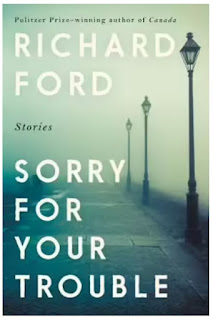Sorry For Your Troubles
The first of the stories takes place in New Orleans. A middle-aged, married man Sandy McGuiness is out with business associates when he spies a slender woman in a brown dress, who returns his gaze with something like recognition. Ford switches to the past – thirty-five years earlier, when Sandy and Barbara (the slender woman in a brown dress) traveled together to Iceland. They’d bunked down in a rustic fishing hut, while she read Neruda and Plath. He'd returned and she hadn’t. ‘Good choices don’t make very good stories,’ she’d said. He studied law, married, had children, lived solidly in the world of corporate law. Then she was there again, in a crowed bar in New Orleans.
‘Happy’ involves a literary crowd – writers, artists, a publisher’s wife. ‘Happy’ is Bobbi Kamper, and Bobbie and Mick had (according to Mick) a ‘marriage de convenance without the marriage and little of the convenance’ (p.28). Tommy and Bobbi have had a moment or two together in the past, as Bobbi now reminds Tommy (‘Oh, and you failed … Cravenly. Abjectly’ [p.41]). Years of intermingling and friendship and then one of them is no longer there – a relatable story, even at the relatively younger age of this reader, hoping against hope that friends and family will be there forever.
There are nine stories in this collection. ‘Displaced’ is the next, a story closer to older Ford themes – a recollection of a poor Irish family who once came to stay in an apartment nearby, and their troubled son. ‘Crossing’ involves a mid-channel conversation between Tom (divorcee, lawyer) and three free-spirited American women, all divorced. ‘The Run of Yourself’ is a story I think I’d return to more than the others – Peter Boyce’s wife has died (she’s taken her own life) and he’s back in a house on Cod Cove Road wondering if he could live in a place where troubled souls dwell once the holiday-makers return to New York. Boyce is reading Mrs Dalloway, while he tries to work out what comes next. In ‘Jimmy Green – 1992’ we are in Paris and Jimmy meets an intriguing French woman and invites her to a bar on the night of the American election. Being punched in the dark for supporting the wrong candidate (Clinton, over Bush) puts a dampener on the evening, and romance is out and uncertainty, in. In ‘Leaving for Kenosha’, Walter Hobbes treads awkwardly around his teenage daughter’s anger. Ford rather delicately shows post-Katrina race relations, as he thinks about a friend of Louise moving away from New Orleans (no insurance, house ruined). Meanwhile, his daughter dreams of escape to Italy, China or Ireland (‘… and never seeing anybody I know now again’ [p.186] – while Walter learns to ‘let her words pass away’. ‘A Free Day’ is set in Dublin, at an airport hotel, as Eileen Lewis maintains an affair with Tom Magee (the same Tom from ‘Crossing’?) and experiences a crisis of embarrassment when she is locked out of her hotel room, booked in Tom’s name, and must ask for a key to re-enter. ‘Second Language’ is the final and longest story (50-odd pages) dealing again with a divorced man, Jonathan, whose second marriage comes to an abrupt halt (though the story, I feel, meanders).
There are certainly troubles in this collection, some of them Irish, others Irish-American, as Ford seems to suggest that the Celtic spirit passes through the generations. We must not forget our struggling forebears in the relative success of American life, it seems to me that Ford is saying, because humility is only a slip up away.




Comments
Post a Comment